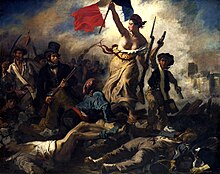Three Colors trilogy
Appearance

The Three Colors trilogy (Polish: Trzy kolory, French: Trois couleurs) is the collective title of three films directed by Krzysztof Kieślowski, two made in French and one primarily in Polish. All three were co-written by Kieślowski and Krzysztof Piesiewicz (with story consultants Agnieszka Holland and Sławomir Idziak) and have musical scores by Zbigniew Preisner.
Three Colors: Blue (1993)
[edit]Three Colors: White (1994)
[edit]Three Colors: Red (1994)
[edit]Principal cast
[edit]- Juliette Binoche - Julie
- Benoît Régent - Olivier
- Florence Pernel - Sandrine
- Zbigniew Zamachowski - Karol
- Julie Delpy - Dominique
- Janusz Gajos - Mikolaj
- Irène Jacob - Valentine
- Jean-Louis Trintignant - Joseph
- Jean-Pierre Lorit - Auguste
Quotes about Three Colors
[edit]- Sorted alphabetically by author or source
- The colours of the French flag punctuate each of their films, adding yet another layer to the rich palimpsest that Kieślowski creates from his gripping narratives, wrote Colin MacCabe (Three Colors: A Hymn to European Cinema). For they are all at the service of his abiding concerns: that each moment is full of infinite possibility, that our lives are connected and interconnected in ways that we can never fully grasp. The conclusion of the trilogy, when our major characters emerge from a tragic accident, both delivers the pleasure of a happy ending and leaves us all too aware of the five hundred deaths that the narrative has not had time for – an open ending without equal.
- Roberto Galea, in the review Three Colours Trilogy at Culture.PL (July 2012)
- Why so great? Okay, it's three films for the price of one, with a cast of lovelorn judges, lonely emigres and grief-stricken widows searching for consolation in an unforgiving modern day Europe. But while Krzysztof Kieślowski's colour-coded trilogy works through the colours of the French national flag … and is rooted in liberte, egalite and fraternite, it's chock full of universal themes and emotions. They won't cheer you up — many of them centre on loss and sorrow — but just try not to be moved by them.
- Review of their ranking at 14th of "The 100 Best Films Of World Cinema" at Empire online (2010)

